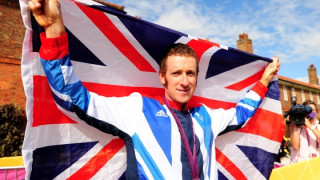BRADLEY WIGGINS collected the seventh Olympic medal of his career when he won the time trial at Hampton Court Palace. The boy who won a bronze medal as part of the team pursuit squad in Sydney 12 years ago is now a man with four gold medals.
Above: Wiggins poses with the Union Jack and his seventh Olympic medal, a first for a Brtish athlete.
No other British athlete has won seven Olympic medals. The rower, Sir Steve Redgrave, has six, five of which are gold. That puts Wiggins up there among the most successful British Olympians of all time. That his success spans four disciplines – the team and individual pursuits, Madison and time trial – must make him one of the most versatile Olympic medallists too.
Wiggins was 20 when he represented Great Britain at the 2000 Olympics in Sydney. He teamed up with Bryan Steel, Paul Manning and Chris Newton in the qualifying round of the team pursuit. They topped the leaderboard ahead of Ukraine and France, setting a new Olympic record in the process.
That meant they faced Russia in the first knock-out round and the same quartet caught and passed their opponents, who included Vladimir Karpets in their line-up, to reach the semi-finals.
Rob Hayles and Jonny Clay replaced Steel and Newton in their showdown against Ukraine. Although the British team rode almost two seconds faster than they had done in qualifying, they lost to Ukraine, who broke the world record.
France were no match for the British in the bronze medal match, which saw Steel and Newton restored to the team, and another national record time.
A few days later, Wiggins and Hayles teamed up for the Madison, which was to produce one of the most heart-breaking stories of the Sydney Games. The dove-tailed superbly to stay in the hunt for a medal until the very end. They looked set for a medal until Hayles crashed in sight of the line, the Italians won crucial points in the final sprint and bumped them down to fourth place.
In Athens, Wiggins returned home with a medal of each colour after one of the most successful Games by a British athlete. Already regarded as the finest individual pursuit rider of the post-Superman position era, Wiggins qualified fastest, then breezed past Fabien Sanchez of France into the final.
He was up against the Australian Brad McGee, a former team-mate at the Française des Jeux team and the man who had denied him gold by catching him in the pursuit final in the Commonwealth Games in Manchester two years earlier. There was to be no repeat. Wiggins’s victory was defiant.
The Aussies, by now setting the standard in the team pursuit, were formidable opposition in the final. Coming on the back of his gruelling individual pursuit programme, Wiggins sat out the qualification round of the team event but stepped in for the knock-out round and lined up with Steve Cummings, Hayles and Manning.
Wiggins and Hayles reprised their partnership in the Madison and despite another, less costly, crash managed to win the bronze medal they’d so nearly clinched four years earlier.
Having won three medals in Athens, Wiggins believed he could win three golds in Beijing. He will probably not know how significant a mystery illness he contracted at the pre-Games holding camp in Newport was.
Having recovered to dominate the individual pursuit again, he was part of the world record-breaking team that defeated the Danes in the final.
That left the Madison, where he was to partner Mark Cavendish.
Unfortunately, he had been left exhausted by a hectic schedule of races and they were unable to mount a serious challenge.
Finishing fourth in the 2009 Tour de France changed the game for Wiggins. As soon as he achieved that it looked unlikely he would revert back to the track in time for the London Olympics.
But after clinching the silver medal in the time trial at last year’s World Championships, the possibility of finishing on the podium at his home Olympics began to look a possibility.
And as he said in the post-race interviews in the shadow of Hampton Court Palace: “I’ve got to carry on to Rio now, get that fifth gold.”
Whether we see Wiggins in Brazil in four years’ time remains to be seen but one thing is sure. His position as one of Britain’s finest ever Olympic athletes will remain for ever.
WIGGINS’ MEDAL HAUL
Sydney 2000
Bronze – team pursuit
Athens 2004
Gold – individual pursuit
Silver – team pursuit
Bronze – Madison (with Rob Hayles)
Beijing 2008
Gold – individual pursuit
Gold – team pursuit
London 2012
Gold – time trial
MOST SUCCESSFUL BRITISH OLYMPIANS
7 medals
Bradley Wiggins (cycling 2000-12) 4 gold, 1 silver, 2 bronze
6 medals
Sir Steve Redgrave (rowing 1984-2000) 5 gold, 1 bronze
5 medals
Sir Chris Hoy (cycling 2000-08) 4 gold, 1 silver
Jack Beresford (rowing 1920-36) 3 gold, 2 silver
Henry Taylor (swimming 1908-20) 3 gold, 2 bronze





